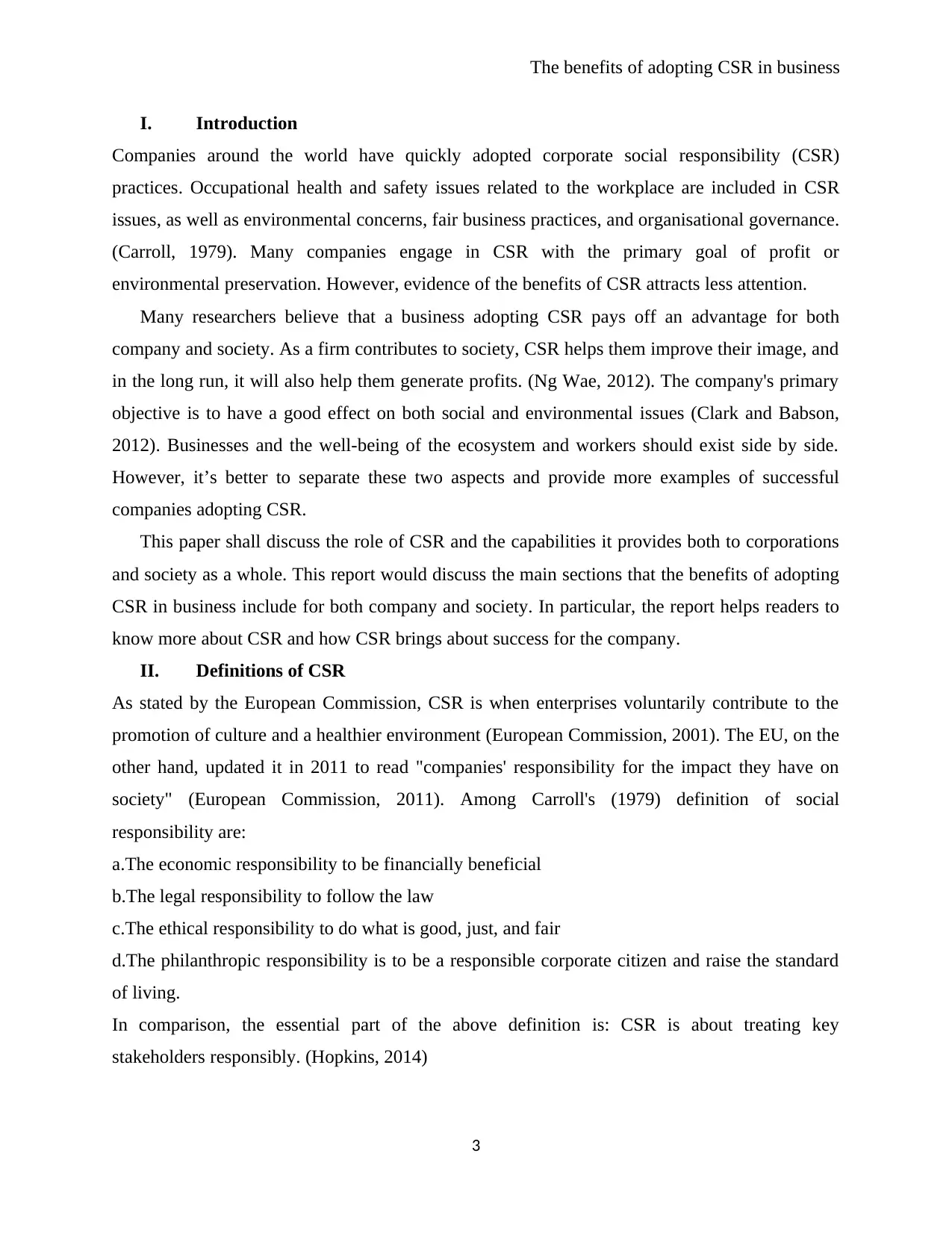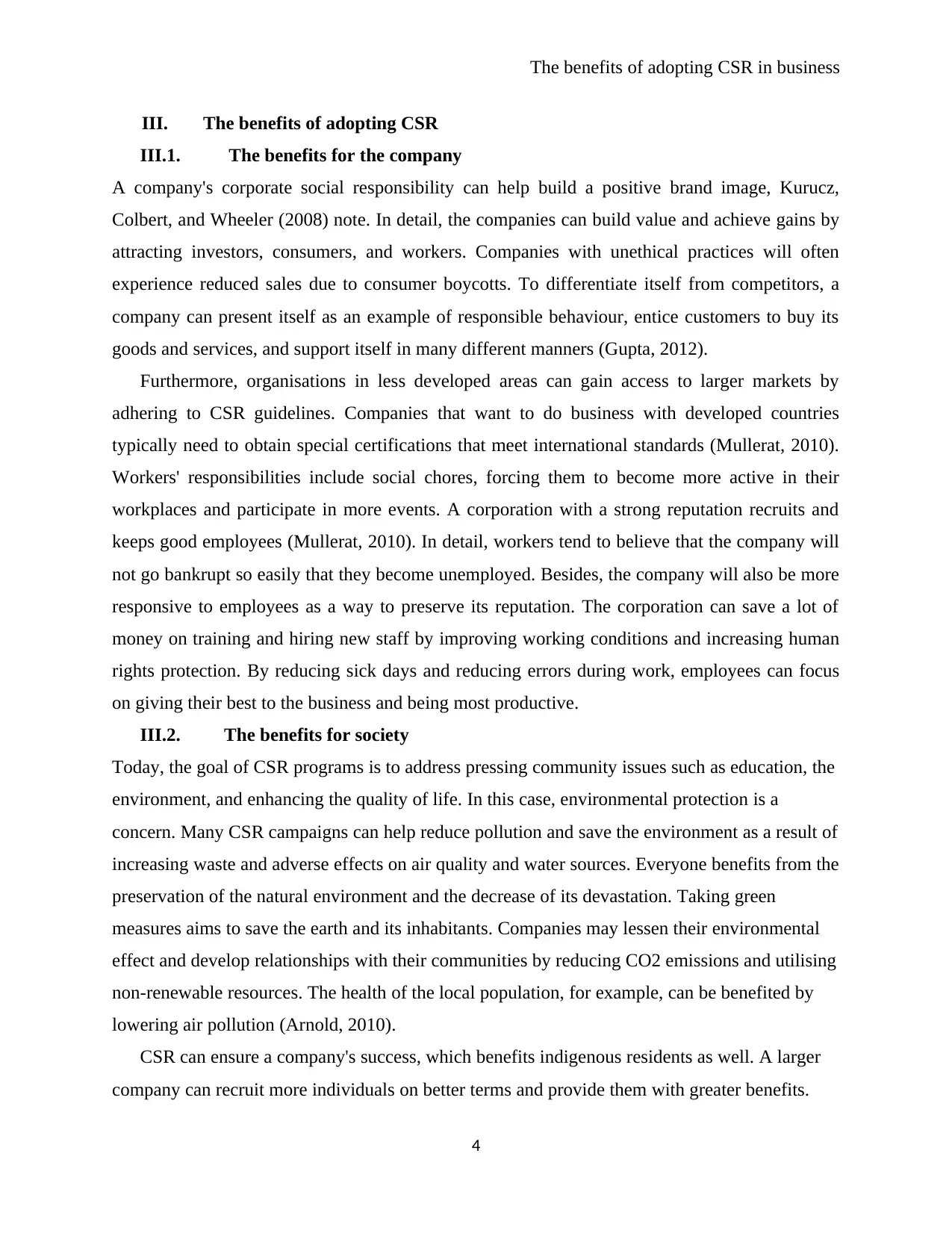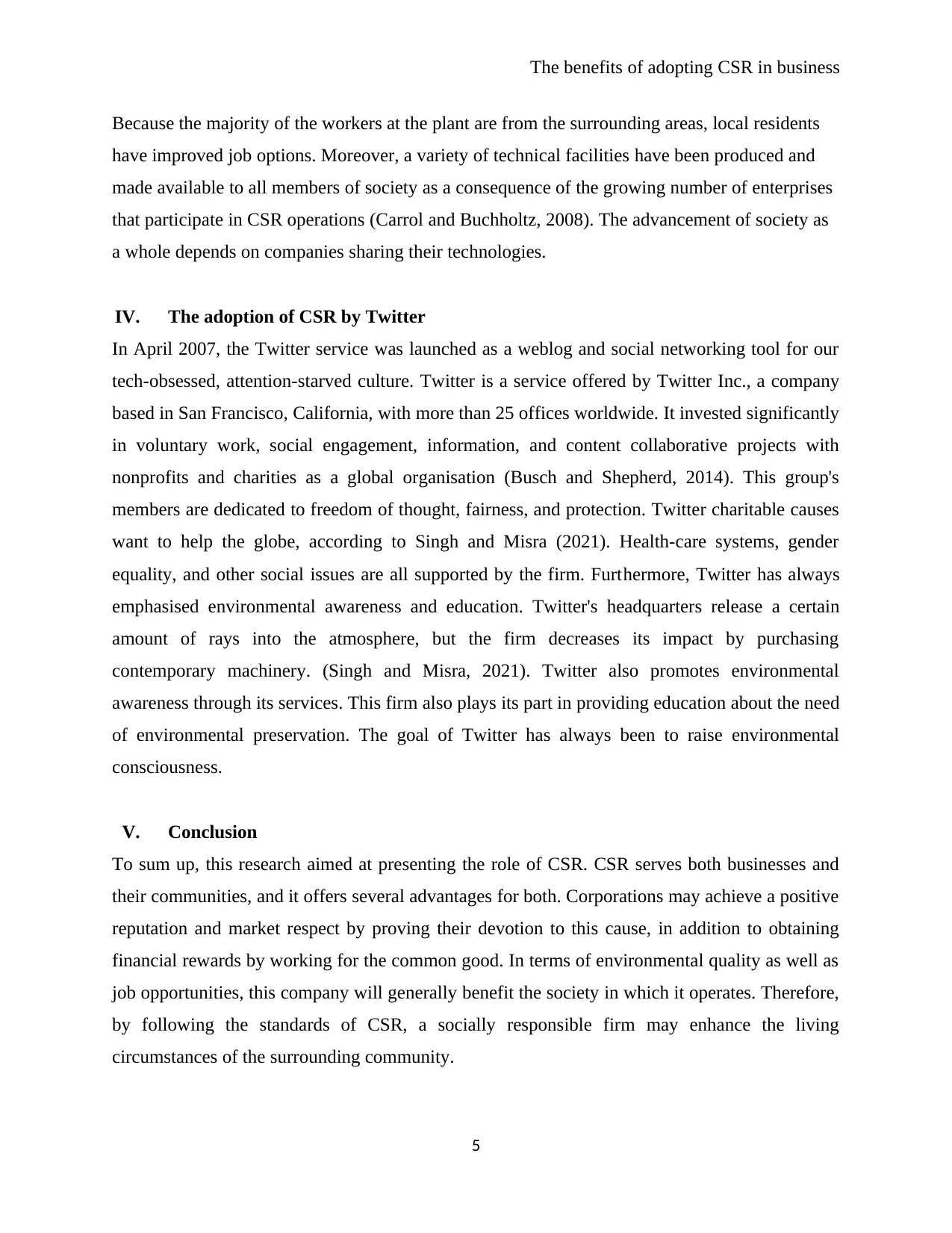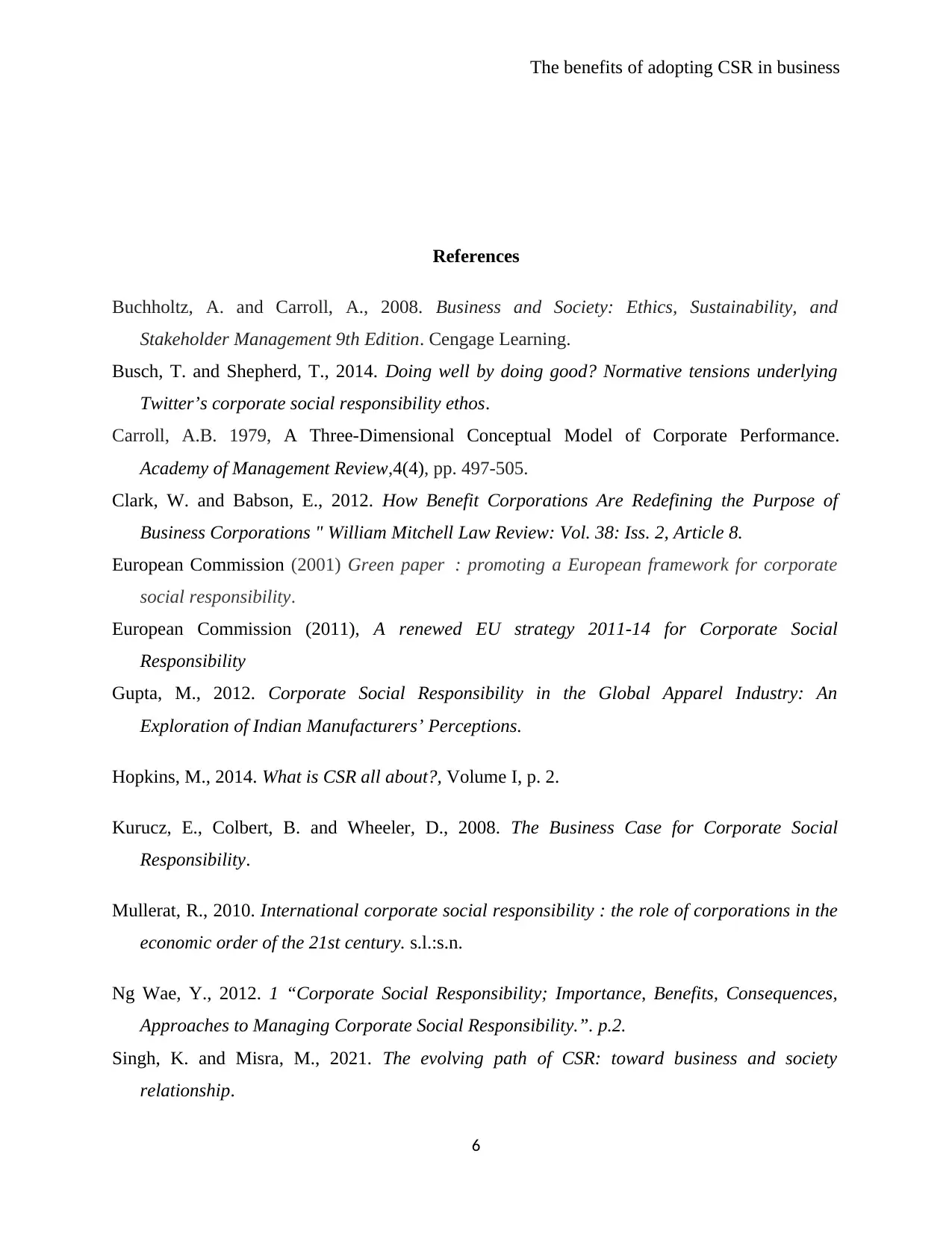Analyzing the Benefits of Adopting Corporate Social Responsibility
VerifiedAdded on 2023/01/17
|7
|1616
|28
Report
AI Summary
This report delves into the multifaceted benefits of corporate social responsibility (CSR) for both businesses and society. It begins by defining CSR according to various sources, including the European Commission and Carroll's framework, which encompasses economic, legal, ethical, and philanthropic responsibilities. The core of the report highlights the advantages for companies, such as improved brand image, increased investor attraction, enhanced employee retention, and access to larger markets. It also examines the positive societal impacts of CSR, including environmental protection, improved quality of life, and enhanced job opportunities. The report uses Twitter as a case study, illustrating how the company engages in CSR through voluntary work, social engagement, and environmental awareness. The conclusion emphasizes that by adhering to CSR standards, companies can improve their reputation, achieve financial rewards, and contribute to the well-being of the community. References from academic journals and books support the findings.

The benefits of adopting CSR in business
TABLE OF CONTENTS
I. Introduction…………………………………………………………………………
II. Definitions of CSR…………………………………………………………………
III. The benefits of adopting CSR………………………….……………….………..
3.1. The benefits for the company …………………………………………………...
3.2. The benefits for society ………………………………………..………………....
IV. The adoption of CSR by Twitter ………………………………………………...
V. Conclusion………………………………………………………………………….
References……………………………………………………………………………...
3
3
4
4
4
5
5
6
1
TABLE OF CONTENTS
I. Introduction…………………………………………………………………………
II. Definitions of CSR…………………………………………………………………
III. The benefits of adopting CSR………………………….……………….………..
3.1. The benefits for the company …………………………………………………...
3.2. The benefits for society ………………………………………..………………....
IV. The adoption of CSR by Twitter ………………………………………………...
V. Conclusion………………………………………………………………………….
References……………………………………………………………………………...
3
3
4
4
4
5
5
6
1
Paraphrase This Document
Need a fresh take? Get an instant paraphrase of this document with our AI Paraphraser

The benefits of adopting CSR in business
2
2

The benefits of adopting CSR in business
I. Introduction
Companies around the world have quickly adopted corporate social responsibility (CSR)
practices. Occupational health and safety issues related to the workplace are included in CSR
issues, as well as environmental concerns, fair business practices, and organisational governance.
(Carroll, 1979). Many companies engage in CSR with the primary goal of profit or
environmental preservation. However, evidence of the benefits of CSR attracts less attention.
Many researchers believe that a business adopting CSR pays off an advantage for both
company and society. As a firm contributes to society, CSR helps them improve their image, and
in the long run, it will also help them generate profits. (Ng Wae, 2012). The company's primary
objective is to have a good effect on both social and environmental issues (Clark and Babson,
2012). Businesses and the well-being of the ecosystem and workers should exist side by side.
However, it’s better to separate these two aspects and provide more examples of successful
companies adopting CSR.
This paper shall discuss the role of CSR and the capabilities it provides both to corporations
and society as a whole. This report would discuss the main sections that the benefits of adopting
CSR in business include for both company and society. In particular, the report helps readers to
know more about CSR and how CSR brings about success for the company.
II. Definitions of CSR
As stated by the European Commission, CSR is when enterprises voluntarily contribute to the
promotion of culture and a healthier environment (European Commission, 2001). The EU, on the
other hand, updated it in 2011 to read "companies' responsibility for the impact they have on
society" (European Commission, 2011). Among Carroll's (1979) definition of social
responsibility are:
a.The economic responsibility to be financially beneficial
b.The legal responsibility to follow the law
c.The ethical responsibility to do what is good, just, and fair
d.The philanthropic responsibility is to be a responsible corporate citizen and raise the standard
of living.
In comparison, the essential part of the above definition is: CSR is about treating key
stakeholders responsibly. (Hopkins, 2014)
3
I. Introduction
Companies around the world have quickly adopted corporate social responsibility (CSR)
practices. Occupational health and safety issues related to the workplace are included in CSR
issues, as well as environmental concerns, fair business practices, and organisational governance.
(Carroll, 1979). Many companies engage in CSR with the primary goal of profit or
environmental preservation. However, evidence of the benefits of CSR attracts less attention.
Many researchers believe that a business adopting CSR pays off an advantage for both
company and society. As a firm contributes to society, CSR helps them improve their image, and
in the long run, it will also help them generate profits. (Ng Wae, 2012). The company's primary
objective is to have a good effect on both social and environmental issues (Clark and Babson,
2012). Businesses and the well-being of the ecosystem and workers should exist side by side.
However, it’s better to separate these two aspects and provide more examples of successful
companies adopting CSR.
This paper shall discuss the role of CSR and the capabilities it provides both to corporations
and society as a whole. This report would discuss the main sections that the benefits of adopting
CSR in business include for both company and society. In particular, the report helps readers to
know more about CSR and how CSR brings about success for the company.
II. Definitions of CSR
As stated by the European Commission, CSR is when enterprises voluntarily contribute to the
promotion of culture and a healthier environment (European Commission, 2001). The EU, on the
other hand, updated it in 2011 to read "companies' responsibility for the impact they have on
society" (European Commission, 2011). Among Carroll's (1979) definition of social
responsibility are:
a.The economic responsibility to be financially beneficial
b.The legal responsibility to follow the law
c.The ethical responsibility to do what is good, just, and fair
d.The philanthropic responsibility is to be a responsible corporate citizen and raise the standard
of living.
In comparison, the essential part of the above definition is: CSR is about treating key
stakeholders responsibly. (Hopkins, 2014)
3
⊘ This is a preview!⊘
Do you want full access?
Subscribe today to unlock all pages.

Trusted by 1+ million students worldwide

The benefits of adopting CSR in business
III. The benefits of adopting CSR
III.1. The benefits for the company
A company's corporate social responsibility can help build a positive brand image, Kurucz,
Colbert, and Wheeler (2008) note. In detail, the companies can build value and achieve gains by
attracting investors, consumers, and workers. Companies with unethical practices will often
experience reduced sales due to consumer boycotts. To differentiate itself from competitors, a
company can present itself as an example of responsible behaviour, entice customers to buy its
goods and services, and support itself in many different manners (Gupta, 2012).
Furthermore, organisations in less developed areas can gain access to larger markets by
adhering to CSR guidelines. Companies that want to do business with developed countries
typically need to obtain special certifications that meet international standards (Mullerat, 2010).
Workers' responsibilities include social chores, forcing them to become more active in their
workplaces and participate in more events. A corporation with a strong reputation recruits and
keeps good employees (Mullerat, 2010). In detail, workers tend to believe that the company will
not go bankrupt so easily that they become unemployed. Besides, the company will also be more
responsive to employees as a way to preserve its reputation. The corporation can save a lot of
money on training and hiring new staff by improving working conditions and increasing human
rights protection. By reducing sick days and reducing errors during work, employees can focus
on giving their best to the business and being most productive.
III.2. The benefits for society
Today, the goal of CSR programs is to address pressing community issues such as education, the
environment, and enhancing the quality of life. In this case, environmental protection is a
concern. Many CSR campaigns can help reduce pollution and save the environment as a result of
increasing waste and adverse effects on air quality and water sources. Everyone benefits from the
preservation of the natural environment and the decrease of its devastation. Taking green
measures aims to save the earth and its inhabitants. Companies may lessen their environmental
effect and develop relationships with their communities by reducing CO2 emissions and utilising
non-renewable resources. The health of the local population, for example, can be benefited by
lowering air pollution (Arnold, 2010).
CSR can ensure a company's success, which benefits indigenous residents as well. A larger
company can recruit more individuals on better terms and provide them with greater benefits.
4
III. The benefits of adopting CSR
III.1. The benefits for the company
A company's corporate social responsibility can help build a positive brand image, Kurucz,
Colbert, and Wheeler (2008) note. In detail, the companies can build value and achieve gains by
attracting investors, consumers, and workers. Companies with unethical practices will often
experience reduced sales due to consumer boycotts. To differentiate itself from competitors, a
company can present itself as an example of responsible behaviour, entice customers to buy its
goods and services, and support itself in many different manners (Gupta, 2012).
Furthermore, organisations in less developed areas can gain access to larger markets by
adhering to CSR guidelines. Companies that want to do business with developed countries
typically need to obtain special certifications that meet international standards (Mullerat, 2010).
Workers' responsibilities include social chores, forcing them to become more active in their
workplaces and participate in more events. A corporation with a strong reputation recruits and
keeps good employees (Mullerat, 2010). In detail, workers tend to believe that the company will
not go bankrupt so easily that they become unemployed. Besides, the company will also be more
responsive to employees as a way to preserve its reputation. The corporation can save a lot of
money on training and hiring new staff by improving working conditions and increasing human
rights protection. By reducing sick days and reducing errors during work, employees can focus
on giving their best to the business and being most productive.
III.2. The benefits for society
Today, the goal of CSR programs is to address pressing community issues such as education, the
environment, and enhancing the quality of life. In this case, environmental protection is a
concern. Many CSR campaigns can help reduce pollution and save the environment as a result of
increasing waste and adverse effects on air quality and water sources. Everyone benefits from the
preservation of the natural environment and the decrease of its devastation. Taking green
measures aims to save the earth and its inhabitants. Companies may lessen their environmental
effect and develop relationships with their communities by reducing CO2 emissions and utilising
non-renewable resources. The health of the local population, for example, can be benefited by
lowering air pollution (Arnold, 2010).
CSR can ensure a company's success, which benefits indigenous residents as well. A larger
company can recruit more individuals on better terms and provide them with greater benefits.
4
Paraphrase This Document
Need a fresh take? Get an instant paraphrase of this document with our AI Paraphraser

The benefits of adopting CSR in business
Because the majority of the workers at the plant are from the surrounding areas, local residents
have improved job options. Moreover, a variety of technical facilities have been produced and
made available to all members of society as a consequence of the growing number of enterprises
that participate in CSR operations (Carrol and Buchholtz, 2008). The advancement of society as
a whole depends on companies sharing their technologies.
IV. The adoption of CSR by Twitter
In April 2007, the Twitter service was launched as a weblog and social networking tool for our
tech-obsessed, attention-starved culture. Twitter is a service offered by Twitter Inc., a company
based in San Francisco, California, with more than 25 offices worldwide. It invested significantly
in voluntary work, social engagement, information, and content collaborative projects with
nonprofits and charities as a global organisation (Busch and Shepherd, 2014). This group's
members are dedicated to freedom of thought, fairness, and protection. Twitter charitable causes
want to help the globe, according to Singh and Misra (2021). Health-care systems, gender
equality, and other social issues are all supported by the firm. Furthermore, Twitter has always
emphasised environmental awareness and education. Twitter's headquarters release a certain
amount of rays into the atmosphere, but the firm decreases its impact by purchasing
contemporary machinery. (Singh and Misra, 2021). Twitter also promotes environmental
awareness through its services. This firm also plays its part in providing education about the need
of environmental preservation. The goal of Twitter has always been to raise environmental
consciousness.
V. Conclusion
To sum up, this research aimed at presenting the role of CSR. CSR serves both businesses and
their communities, and it offers several advantages for both. Corporations may achieve a positive
reputation and market respect by proving their devotion to this cause, in addition to obtaining
financial rewards by working for the common good. In terms of environmental quality as well as
job opportunities, this company will generally benefit the society in which it operates. Therefore,
by following the standards of CSR, a socially responsible firm may enhance the living
circumstances of the surrounding community.
5
Because the majority of the workers at the plant are from the surrounding areas, local residents
have improved job options. Moreover, a variety of technical facilities have been produced and
made available to all members of society as a consequence of the growing number of enterprises
that participate in CSR operations (Carrol and Buchholtz, 2008). The advancement of society as
a whole depends on companies sharing their technologies.
IV. The adoption of CSR by Twitter
In April 2007, the Twitter service was launched as a weblog and social networking tool for our
tech-obsessed, attention-starved culture. Twitter is a service offered by Twitter Inc., a company
based in San Francisco, California, with more than 25 offices worldwide. It invested significantly
in voluntary work, social engagement, information, and content collaborative projects with
nonprofits and charities as a global organisation (Busch and Shepherd, 2014). This group's
members are dedicated to freedom of thought, fairness, and protection. Twitter charitable causes
want to help the globe, according to Singh and Misra (2021). Health-care systems, gender
equality, and other social issues are all supported by the firm. Furthermore, Twitter has always
emphasised environmental awareness and education. Twitter's headquarters release a certain
amount of rays into the atmosphere, but the firm decreases its impact by purchasing
contemporary machinery. (Singh and Misra, 2021). Twitter also promotes environmental
awareness through its services. This firm also plays its part in providing education about the need
of environmental preservation. The goal of Twitter has always been to raise environmental
consciousness.
V. Conclusion
To sum up, this research aimed at presenting the role of CSR. CSR serves both businesses and
their communities, and it offers several advantages for both. Corporations may achieve a positive
reputation and market respect by proving their devotion to this cause, in addition to obtaining
financial rewards by working for the common good. In terms of environmental quality as well as
job opportunities, this company will generally benefit the society in which it operates. Therefore,
by following the standards of CSR, a socially responsible firm may enhance the living
circumstances of the surrounding community.
5

The benefits of adopting CSR in business
References
Buchholtz, A. and Carroll, A., 2008. Business and Society: Ethics, Sustainability, and
Stakeholder Management 9th Edition. Cengage Learning.
Busch, T. and Shepherd, T., 2014. Doing well by doing good? Normative tensions underlying
Twitter’s corporate social responsibility ethos.
Carroll, A.B. 1979, A Three-Dimensional Conceptual Model of Corporate Performance.
Academy of Management Review,4(4), pp. 497-505.
Clark, W. and Babson, E., 2012. How Benefit Corporations Are Redefining the Purpose of
Business Corporations " William Mitchell Law Review: Vol. 38: Iss. 2, Article 8.
European Commission (2001) Green paper : promoting a European framework for corporate
social responsibility.
European Commission (2011), A renewed EU strategy 2011-14 for Corporate Social
Responsibility
Gupta, M., 2012. Corporate Social Responsibility in the Global Apparel Industry: An
Exploration of Indian Manufacturers’ Perceptions.
Hopkins, M., 2014. What is CSR all about?, Volume I, p. 2.
Kurucz, E., Colbert, B. and Wheeler, D., 2008. The Business Case for Corporate Social
Responsibility.
Mullerat, R., 2010. International corporate social responsibility : the role of corporations in the
economic order of the 21st century. s.l.:s.n.
Ng Wae, Y., 2012. 1 “Corporate Social Responsibility; Importance, Benefits, Consequences,
Approaches to Managing Corporate Social Responsibility.”. p.2.
Singh, K. and Misra, M., 2021. The evolving path of CSR: toward business and society
relationship.
6
References
Buchholtz, A. and Carroll, A., 2008. Business and Society: Ethics, Sustainability, and
Stakeholder Management 9th Edition. Cengage Learning.
Busch, T. and Shepherd, T., 2014. Doing well by doing good? Normative tensions underlying
Twitter’s corporate social responsibility ethos.
Carroll, A.B. 1979, A Three-Dimensional Conceptual Model of Corporate Performance.
Academy of Management Review,4(4), pp. 497-505.
Clark, W. and Babson, E., 2012. How Benefit Corporations Are Redefining the Purpose of
Business Corporations " William Mitchell Law Review: Vol. 38: Iss. 2, Article 8.
European Commission (2001) Green paper : promoting a European framework for corporate
social responsibility.
European Commission (2011), A renewed EU strategy 2011-14 for Corporate Social
Responsibility
Gupta, M., 2012. Corporate Social Responsibility in the Global Apparel Industry: An
Exploration of Indian Manufacturers’ Perceptions.
Hopkins, M., 2014. What is CSR all about?, Volume I, p. 2.
Kurucz, E., Colbert, B. and Wheeler, D., 2008. The Business Case for Corporate Social
Responsibility.
Mullerat, R., 2010. International corporate social responsibility : the role of corporations in the
economic order of the 21st century. s.l.:s.n.
Ng Wae, Y., 2012. 1 “Corporate Social Responsibility; Importance, Benefits, Consequences,
Approaches to Managing Corporate Social Responsibility.”. p.2.
Singh, K. and Misra, M., 2021. The evolving path of CSR: toward business and society
relationship.
6
⊘ This is a preview!⊘
Do you want full access?
Subscribe today to unlock all pages.

Trusted by 1+ million students worldwide

The benefits of adopting CSR in business
7
7
1 out of 7
Related Documents
Your All-in-One AI-Powered Toolkit for Academic Success.
+13062052269
info@desklib.com
Available 24*7 on WhatsApp / Email
![[object Object]](/_next/static/media/star-bottom.7253800d.svg)
Unlock your academic potential
Copyright © 2020–2026 A2Z Services. All Rights Reserved. Developed and managed by ZUCOL.





